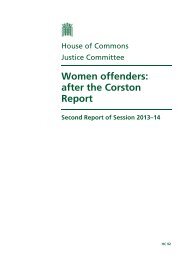<strong>of</strong>ten available for assessing patients who present in emergency situations as a factor affecting<strong>the</strong> identification <strong>of</strong> needs. 84Ethnicity is not <strong>the</strong> only factor affecting diagnosis <strong>of</strong> a mental health problem by clinicians.Secondary analysis <strong>of</strong> <strong>the</strong> British General Health Survey 91-94 revealed that <strong>the</strong>re were nosignificant differences in <strong>the</strong> use <strong>of</strong> health services by children <strong>and</strong> young people <strong>of</strong> differentethnic groups. 85 Recognition <strong>of</strong> psychiatric disorders by GPs has generally failed to take <strong>into</strong>account <strong>the</strong> role that ethnicity plays. To underst<strong>and</strong> <strong>and</strong> address <strong>the</strong> mental health needs <strong>of</strong>minority ethnic groups, pr<strong>of</strong>essionals need to recognise <strong>the</strong> diversity <strong>of</strong> individual needs <strong>and</strong>cultures. 86There is much debate around <strong>the</strong> extent to which an illness is culturally shaped. The EMPIRICstudy, for example, has caused much controversy with its findings that emotional experiences<strong>of</strong> distress appeared to be broadly universal <strong>and</strong> that physical symptoms <strong>and</strong> idioms werecommon across all groups. However, some specific symptoms <strong>and</strong> some experiences, such asloss <strong>of</strong> confidence or self-esteem, guilt or shame, were not universal. This study gives nosupport to <strong>the</strong> claim that Asian patients, ra<strong>the</strong>r than o<strong>the</strong>rs, somatise. 87 Similarly, a study <strong>of</strong>Punjabi <strong>and</strong> English people visiting <strong>the</strong>ir general practitioner found that Punjabi cases were notmore likely to have somatic symptoms. However, GPs were more likely to assess Punjabis withcommon mental disorders as having ‘physical <strong>and</strong> somatic’ symptoms. 88A study <strong>of</strong> <strong>the</strong> prevalence <strong>of</strong> anxiety <strong>and</strong> depressive illness <strong>and</strong> help-seeking behaviour inAfrican Caribbeans <strong>and</strong> White Europeans found that most people <strong>of</strong> both ethnicities hadconsulted <strong>the</strong>ir doctor, but most presented with somatic, ra<strong>the</strong>r than psychological, symptoms.What resulted however, was that GPs recognised a psychological problem in 27% <strong>of</strong> AfricanCaribbeans <strong>and</strong> 52% <strong>of</strong> White Europeans. 89<strong>Minority</strong> Voices <strong>Research</strong> Report15
4. METHODOLOGYThe study methodThe project started in May 2003, with funding from The Diana, Princess <strong>of</strong> Wales MemorialFund. Essentially, this was a national study, with <strong>the</strong> mapping <strong>of</strong> Tier 1 activity <strong>and</strong> ‘goodpractice’ across Engl<strong>and</strong> <strong>and</strong> Wales. It was intended to work in depth in six sample areas,selected to include differing characteristics: urban <strong>and</strong> rural areas; areas with high <strong>and</strong> lowprevalence <strong>of</strong> young people from minority ethnic groups; <strong>and</strong> areas where <strong>the</strong>re was known tobe specific service development for this client group as well as where <strong>the</strong>re was little knowntargeted activity.Subsequent funding difficulties meant that <strong>the</strong> research team were only able to work in foursample areas. However, funds were made available for <strong>the</strong> project from The Henry SmithCharity, <strong>the</strong> Department <strong>of</strong> Health, NIMHE <strong>and</strong> <strong>the</strong> Children <strong>and</strong> Young People’s Unit (CYPU)<strong>and</strong> this support allowed <strong>the</strong> research team to produce more extensive resources for youngpeople than originally planned (all <strong>of</strong> which are available for downloading from <strong>the</strong> YoungMindswebsite - www.youngminds.org.uk/minority<strong>voices</strong>).A mixed methods approach• Qualitative methods were developed to meet <strong>the</strong> study aims <strong>and</strong> objectives, with semistructuredinterviews <strong>and</strong> focus groups being used as <strong>the</strong> main methods <strong>of</strong> collectingdata from young people, families <strong>and</strong> <strong>the</strong> staff working with <strong>the</strong>m. In some caseshowever, due to problems organising face to face meetings, telephone interviews orpostal questionnaires had to be used instead. As much as possible, <strong>the</strong> interviews <strong>and</strong>focus groups aimed to give <strong>the</strong> participants <strong>the</strong> opportunity to express <strong>and</strong> explain <strong>the</strong>irown opinions, ideas <strong>and</strong> priorities. The methodology was awarded London Multi-Centre<strong>Research</strong> Ethics Committee approval on 4 th November 2003.Data were collected from two main sources:• A mapping <strong>of</strong> activity across Engl<strong>and</strong> <strong>and</strong> Wales. Whilst primarily focused on Tier 1,with an aim <strong>of</strong> providing a national overview <strong>of</strong> services at this tier addressing <strong>the</strong>needs <strong>of</strong> young people from Black <strong>and</strong> minority ethnic groups, some information aboutservices at o<strong>the</strong>r tiers was also ga<strong>the</strong>red.• An in-depth study in four sample areas drawn from across Engl<strong>and</strong> <strong>and</strong> Wales. In <strong>the</strong>seareas, largely qualitative data were ga<strong>the</strong>red from both young people with experience<strong>of</strong> using mental health services <strong>and</strong> those without, <strong>and</strong> staff working with <strong>the</strong>m. Severaladditional focus groups were carried out in o<strong>the</strong>r areas <strong>of</strong> <strong>the</strong> country where <strong>the</strong>research team found services for groups <strong>of</strong> particular interest, such as those for asylumseekers.Mapping <strong>of</strong> Tier 1 activity <strong>and</strong> postal questionnairesThe mapping <strong>of</strong> activity focused on services supporting young people from Black <strong>and</strong> minorityethnic groups, <strong>and</strong> identification <strong>of</strong> services possibly demonstrating ‘good practice’ was basedon a number <strong>of</strong> different methods <strong>of</strong> information ga<strong>the</strong>ring, including:• Internet searches.• Postal questionnaires to Primary Care Trusts (PCTs), Looked After Children (LAC)teams, Connexions services, <strong>and</strong> Youth Offending teams (YOTs).• Telephone interviews <strong>and</strong> some site visits.• Calls for information in several journals/specialist mental health magazines <strong>and</strong> on <strong>the</strong>YoungMinds website <strong>and</strong> <strong>the</strong> FOCUS noticeboard.<strong>Minority</strong> Voices <strong>Research</strong> Report16
















